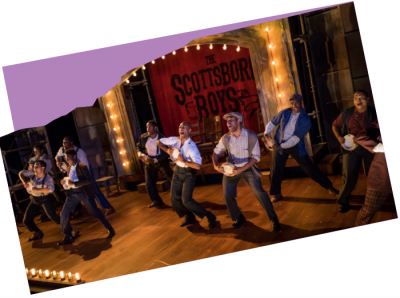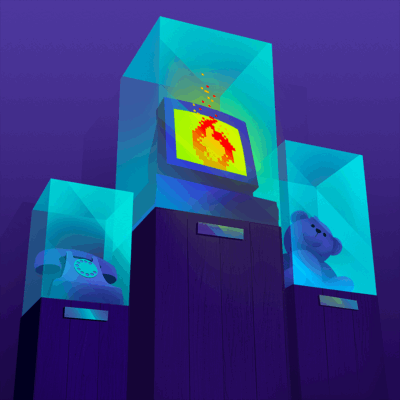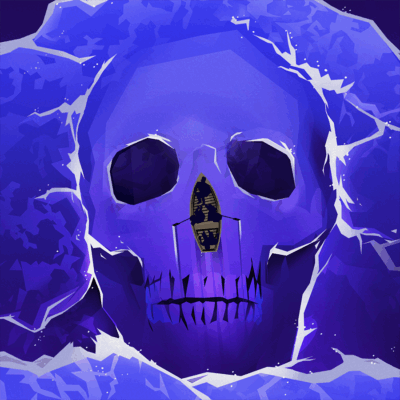Your donation sets the stage for a new season of Boston's most intimate, entertaining and provocative plays and musicals. Our shows make powerful connections with our audiences-- and they are only possible because of you.
Fish Story
Fish Story
John August began his journey with Big Fish almost 17 years ago. As the Daniel Wallace novel neared its publication date, he was given an evening to read the manuscript and decide whether or not to option the film rights. As it turns out, he didn’t even need to get halfway through the book before recognizing the story’s potential. He wrote the screenplay for the 2003 Tim Burton film adaptation, and then, almost immediately afterwards, began working with Andrew Lippa on a stage musical version. It’s been a winding road since then, including productions of Big Fish in Chicago and on Broadway. But now the two men have completed a new version, premiering with SpeakEasy, which aims for a more nimble and spare theatricality. Recently, SpeakEasy Artistic Associate Walt McGough spoke separately with both Mr. August and Mr. Lippa about the story, about working with one another, and about the surprises they’ve encountered along the way.
SPEAKEASY STAGE (SES): When did the idea of a musical version of Big Fish first occur to you?
JOHN AUGUST (JA): I had always yearned to get these characters singing. The movie even felt like it was a musical without songs. So, when we were finishing up our work on the movie, I went to the producers and said, “I really think there is a Broadway musical to make here, because these characters have an inner life that wants to be sung, and we should figure out how to do that.” And at the same time the producers and I were discussing who would be a great composer for the show, Andrew, who had seen the movie, independently approached the producers saying “Hey, I really think there’s a Broadway musical to be made here.” Andrew was honestly the next person on our list of composers to talk to, but, to this day, he doesn’t believe it.
ANDREW LIPPA (AL): That is definitely what they told me, and I do believe them after all these years, finally. But with any project, it’s really good for the parties to get to know each other. So John and I got together for a few days. We got a house in Palm Springs with a piano and a pool, which has turned out to be my contractual pre-requisite now. We wrote a few scenes and songs, and submitted them to the producers who said “This is great. Let’s make a musical.” This was nine years before we opened on Broadway.
JA: Over the course of two days, we wrote two songs and two scenes, came back, and played them for the producers. It felt like the start of a musical. And actually, one of the songs, “A River Between Us,” is newly restored to the show in the Boston edition.
SES: Did you have a particular style of music that you wanted use to tell the story?
AL: We wanted to capture the notion of the countryside, or Alabama-ness, of where the show is set. At the same time, I wasn’t going to write a country score, because I’m not a country writer, so I would’ve been writing it from the outside and I don’t think I would’ve done a good job. We wanted something that was a bit more expansive and that also allowed us to have fantasy and romance and things that would perhaps not have been served as well by country music alone. The show is like a lot of my other work, in that it’s two things going on at the same time. The story itself is a family drama, but the family drama is then punctuated with these big fantasy sequences. So musically, I was free to wander wherever I wanted, but I was also free to keep a unity and a coherence in the score. Many musical scores are just a collection of songs, and the ones that I’m always most drawn to are the ones that are more like opera, where the music interrelates and the themes repeat meaningfully because they have something to tell you about the story.
SES: What was your process when working together to create the show?
JA: We sort of gave each other veto power over everything, so there’s not a word spoken or sung that we both haven’t agreed on. This isn’t the kind of musical where people stop talking and then start singing. It all should feel like one continuous thought, and it should feel like it came from one brain, not two.
AL: Since John had already written the screenplay, he knew a lot of the roads that we shouldn’t go down. I would occasionally suggest things and he’d say “Well, we can’t go that way because…” and he would know why. Also, our circle of experience overlaps in a good way, but not completely; and that’s what makes us good collaborators. John plays the piano and sings a little, and I’ve written the books to two musicals and thus have a good sense of what makes a strong story in a play. We talk each other’s languages, but we also have our own languages that the other doesn’t really know as well.
JA: Fortunately, we were very much in alignment, and over the course of the ten years working together, our lives have tracked together too. I had already lost my father when we started, and Andrew lost his father during the course of the show. We both got married over the course of the show, and there have been these life changes for both of us during it. The show grows as you grow.
AL: You stand in front of a Van Gogh at 20, and you see something very different from when you stand in front of it at 60. The same is true about revisiting pieces of art that you made. The way I saw this story 9 years ago is very different from now. I don’t have kids and so some of that I have to imagine, but I have kids in my life who I’ve known since they were born, and my feeling for them is deeply affected by my being 50 and having lived through 21 years of their lives. At the same time I still have men in my life who are in their late seventies, early 80s, who are father figures in my life. It’s kind of remarkable to really be middle-aged, and have both sides of that experience.
SES: Do you feel a connection to the characters, having spent so much time with them over the years?
JA: Certainly. When I started working on the movie, I was 28 or 29 – the same age as the Will Bloom character. That was very deliberate. I made him a journalism major because I was a journalism major, and I was writing very autobiographically. Over 12 years later, I’m a dad, and I can definitely see things from Edward’s perspective in a way that I couldn’t when I started working on the show. And that is the blessing of time. I think Edward Bloom’s character has a deeper emotional inner life now, just because I’ve had a chance to grow up with him and so has Andrew.
AL: I AM Edward Bloom. I am the guy who has to be careful not to suck all the oxygen out of the room, and not to tell the fourth joke, and not to talk too loud, and not to commandeer the conversation. I’ve been very cognizant of it, and learned how to keep friends and family members, and learned where it comes from. There’s a part of me that – it’s terrific. I host big events, and I am super comfortable in that environment. It’s easy for me, and I love it. The part that nobody knows about me, or that few people know about me, is that I’m actually an isolater, and I don’t like being around people a lot of the time. I think, in part, I commandeer the room because that’s the way that I thwart anxiety. I see that in Edward, too. He’s one of those guys.
SES: That certainly causes a lot of tension between the two men in the show.
AL: Remember the embarrassment you felt about your parents when you were nine, the “Don’t drop me off in front of the school. I’ll walk the block” period of your childhood? Now imagine being 29 and still having that. That’s Will’s problem. He’s in his early 30s and about to have a son, and wants to not repeat the mistakes he feels his father made. He wants to be direct and say, “Dad, tell me the truth about all of this nonsense you’ve been telling me,” because he presumes that his father was telling him nonsense. And that’s the whole point, y’know?
JA: One of the realities of the parent/child relationship, and certainly the reality with my relationship with my own father, is that, throughout your life, you sort of get to pick who you’re going to hang out with, and who you are going to fall in love with. But when it comes to your parents and your kids, it’s just this kind of weird lottery, and there’s all this pressure for everything to just be perfect. And yet, ultimately you are strangers, who’ve been put together. Figuring out those relationships can be the work of a lifetime, and it’s the story of the show: these two men, each trying to figure out who the other person is.
SES: What made you decide to revisit the show post-Broadway and create this new version?
JA: A big part of developing a musical like this one is this process of readings and workshops and work sessions before a show debuts, where you get to see the show in a really primal state. I loved Big Fish in its primal form. I loved Big Fish when it was me and Andrew at the piano. I loved Big Fish when it was just actors at music stands, and I loved it when it was just in a rehearsal studio. There’s something very intimate about being so close to the actors, and seeing the story with none of the trappings around it. So, Andrew and I both had this idea that, at some point, we’d love to see the show taken back down to the boards, to see what was really there underneath it, and let the audience in on a more intimate version.
AL: I think what this new version can do is really powerful. I think that, when you tell the audience from the beginning, “We’re not going to show you much. We’re just going to tell you a lot of stuff and let you fill in the blanks,” it engages their imagination.
JA: Also, when we strip everything down to just the 12 actors, the ensemble becomes even more important. You start to realize that there is a community of people in Edward Bloom’s story who make his life possible. And so we’re found ways to keep the ensemble involved in every aspect of his production, so that a lot of the things that would be done with visual production and mechanics and stagehands in a larger production will be done here with our cast. The idea that it takes a community to tell a story feels very true to Big Fish, but also feels very true to theatre.
 Past Productions
Past Productions The Antiquities
The Antiquities Swept Away
Swept Away




